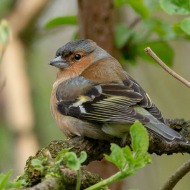
Findings have important implications for conservation
New research led by researchers at Queen's University, Belfast has revealed that human-made noise directly impacts the communication of a number of different animal species.
The meta-analysis study – published today in Global Change Biology – involved analysis of data from 31 different animal species gathered from 23 experimental studies that exposed animals to man-made noise.
Researchers compared each animal's response to a baseline level, in most cases this was the natural background noise level in an the animal's habitat.
The results showed that animals exposed to human-made noise were forced to adjust their acoustic signals when competing for mate attraction, repelling rivals and when communicating with offspring. All of these communication cues have a crucial role in their survival.
Different species were also found to have different levels of sensitivity to noise. The authors stressed that these findings could help make conservation efforts more effective, as a “one size fits all legislation” would not guarantee effective protect of individual species.
Lead author Dr Hansjoerg Kunc, a researcher from the School of Biological Sciences at Queen’s University said: “There are important implications to consider around noise pollution and the protection of wildlife. This research proves man-made noise is clearly disrupting them from being able to hear and understand each other clearly, which has an impact on their future survival.”
“Conservation is traditionally concerned with preserving biodiversity and the habitats that organisms are dependent upon. Given the effects of noise on animals, pristine soundscapes free from man-made noise are crucial to ensure effective conservation.
“This research shows there is no doubt that tackling human-induced environmental changes, such as noise pollution, is a crucial societal and economic challenge that will ultimately determine the health of both ecosystems and organisms, including humans.”



 The Veterinary Medicines Directorate (VMD) is inviting applications from veterinary students to attend a one-week extramural studies (EMS) placement in July 2026.
The Veterinary Medicines Directorate (VMD) is inviting applications from veterinary students to attend a one-week extramural studies (EMS) placement in July 2026.